Developing Manager: Leadership, Communication and Culture Report
VerifiedAdded on 2023/04/11
|31
|4959
|242
Report
AI Summary
This report comprehensively examines various aspects of management, leadership, and organizational dynamics. It begins by exploring different management styles, such as directive, coaching, and scientific approaches, with examples from companies like Thomson Holidays and Thomas Cook Group. The report then delves into leadership characteristics, highlighting qualities like focus, confidence, integrity, and decision-making power. It also discusses communication processes in businesses, emphasizing the evolution of communication techniques and their impact on internal and external operations. Furthermore, the report analyzes organizational culture, including task and power cultures, and change management strategies. The report also covers team motivation, managerial decision-making, and career development, providing insights into self-management skills and the review of career progress. The report concludes by summarizing key findings and providing recommendations for effective management practices.
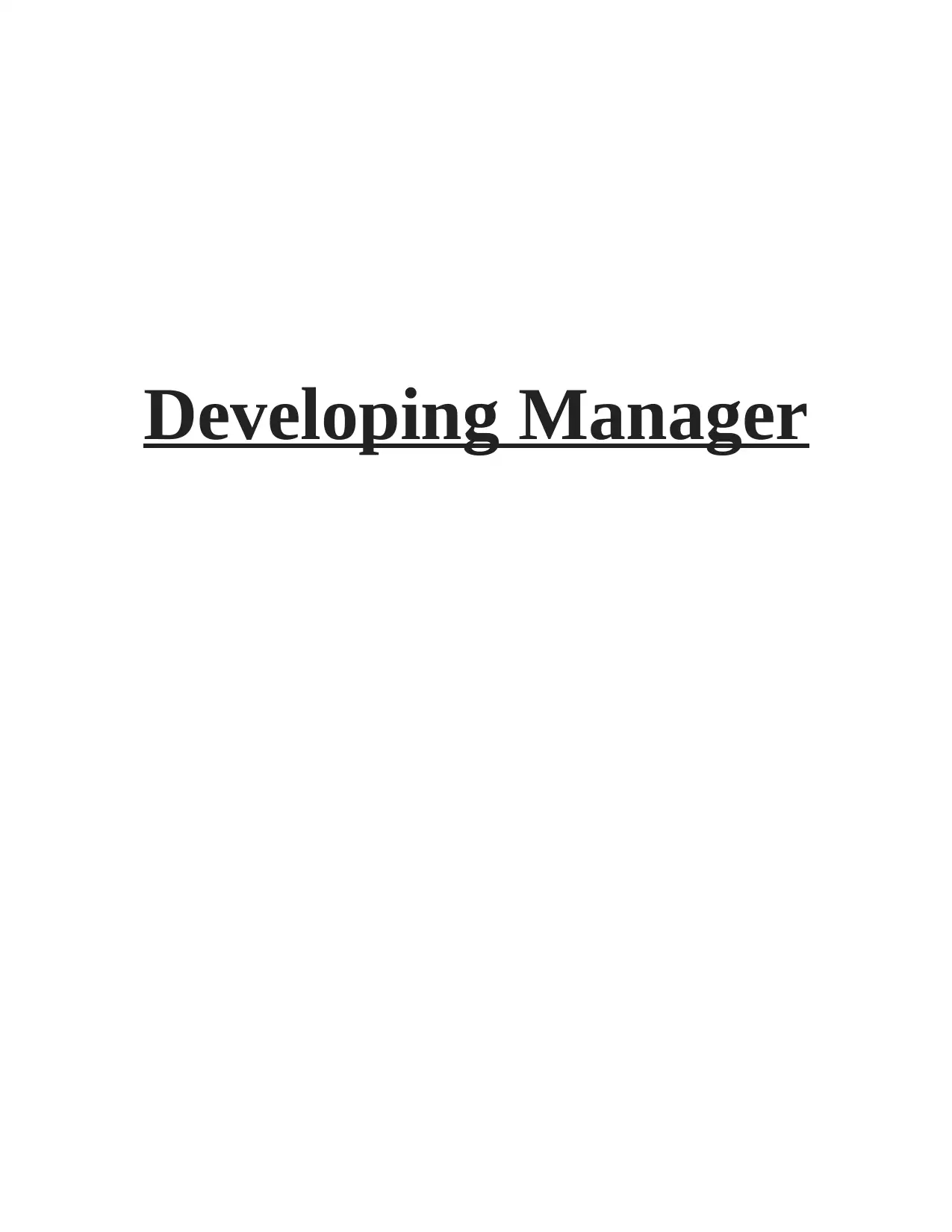
Developing Manager
Paraphrase This Document
Need a fresh take? Get an instant paraphrase of this document with our AI Paraphraser
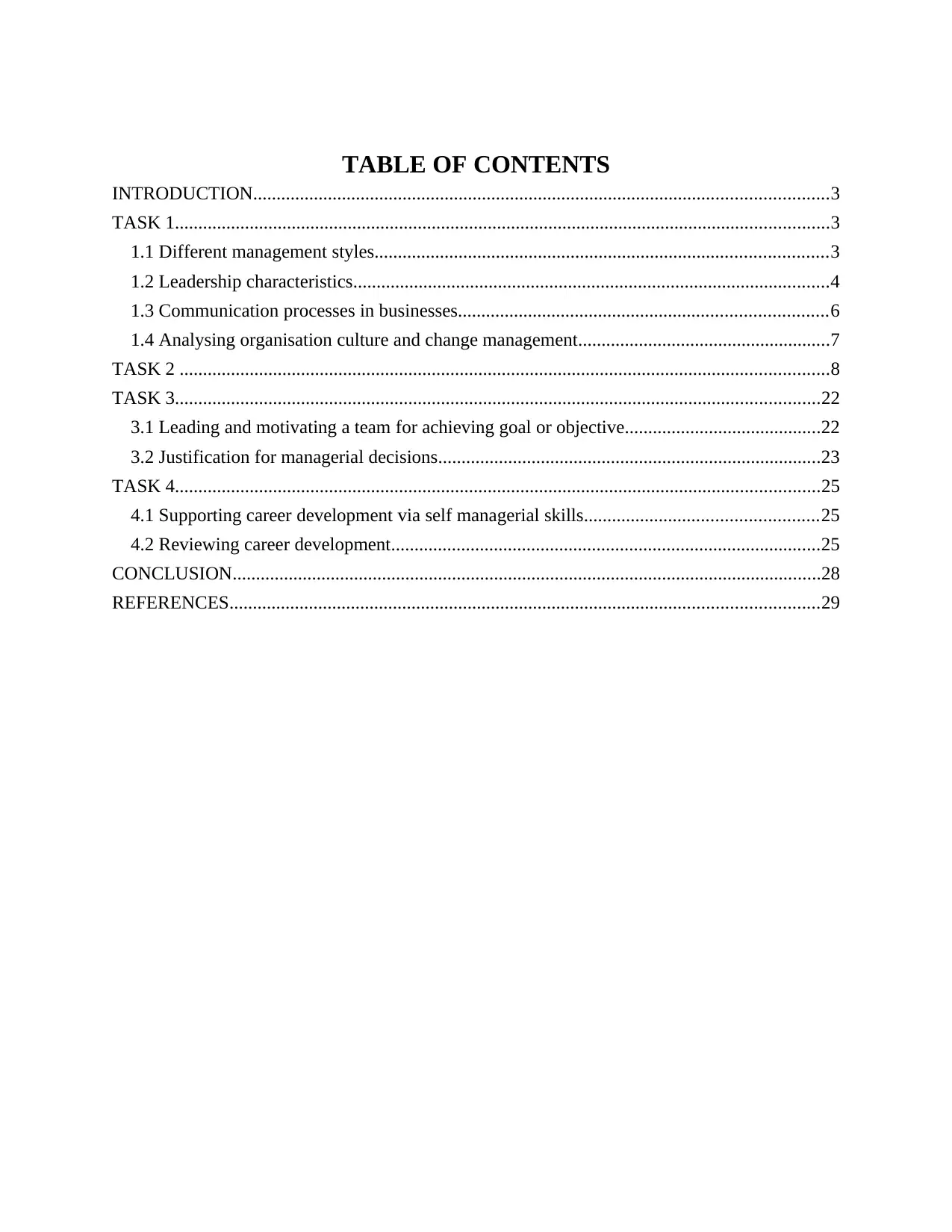
TABLE OF CONTENTS
INTRODUCTION...........................................................................................................................3
TASK 1............................................................................................................................................3
1.1 Different management styles.................................................................................................3
1.2 Leadership characteristics......................................................................................................4
1.3 Communication processes in businesses...............................................................................6
1.4 Analysing organisation culture and change management......................................................7
TASK 2 ...........................................................................................................................................8
TASK 3..........................................................................................................................................22
3.1 Leading and motivating a team for achieving goal or objective..........................................22
3.2 Justification for managerial decisions..................................................................................23
TASK 4..........................................................................................................................................25
4.1 Supporting career development via self managerial skills..................................................25
4.2 Reviewing career development............................................................................................25
CONCLUSION..............................................................................................................................28
REFERENCES..............................................................................................................................29
INTRODUCTION...........................................................................................................................3
TASK 1............................................................................................................................................3
1.1 Different management styles.................................................................................................3
1.2 Leadership characteristics......................................................................................................4
1.3 Communication processes in businesses...............................................................................6
1.4 Analysing organisation culture and change management......................................................7
TASK 2 ...........................................................................................................................................8
TASK 3..........................................................................................................................................22
3.1 Leading and motivating a team for achieving goal or objective..........................................22
3.2 Justification for managerial decisions..................................................................................23
TASK 4..........................................................................................................................................25
4.1 Supporting career development via self managerial skills..................................................25
4.2 Reviewing career development............................................................................................25
CONCLUSION..............................................................................................................................28
REFERENCES..............................................................................................................................29
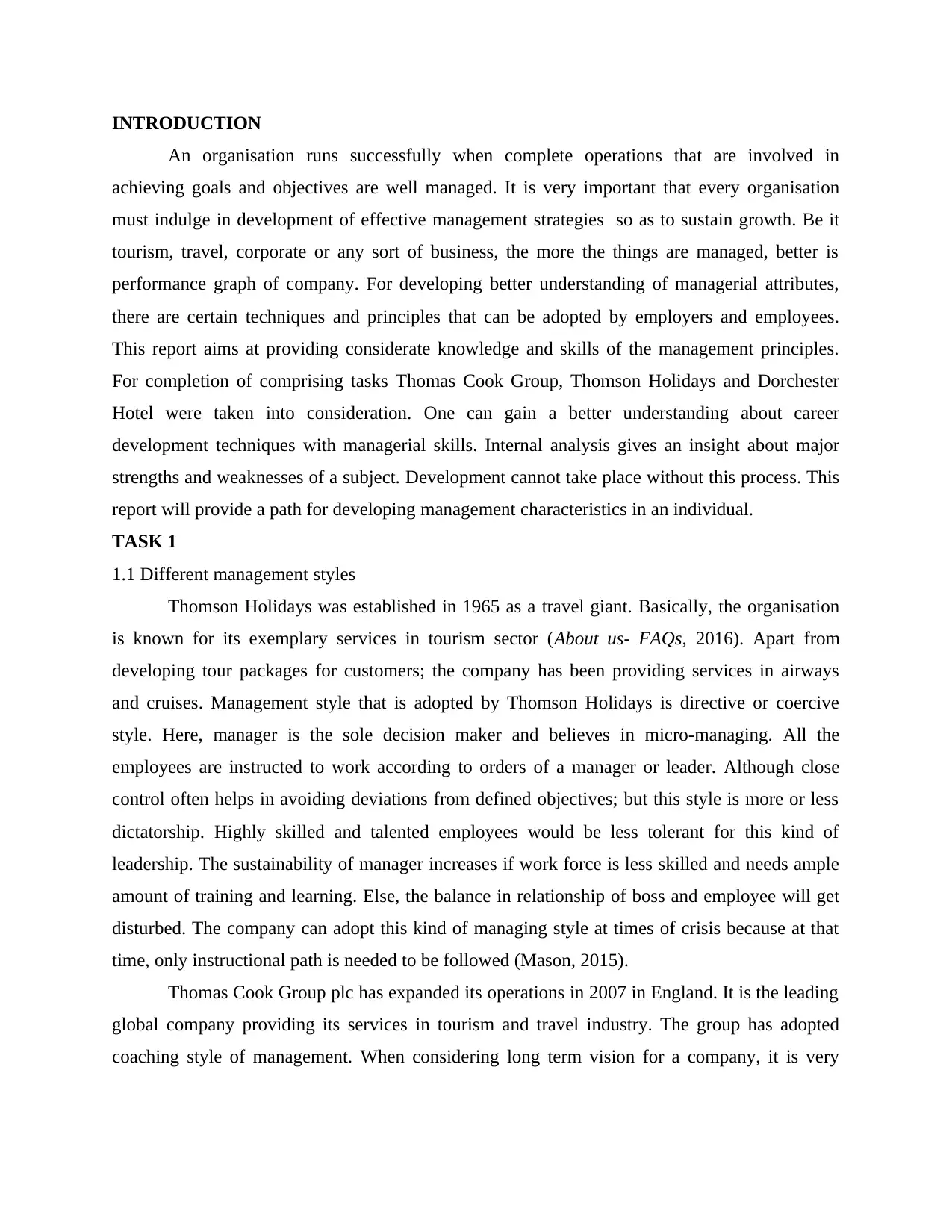
INTRODUCTION
An organisation runs successfully when complete operations that are involved in
achieving goals and objectives are well managed. It is very important that every organisation
must indulge in development of effective management strategies so as to sustain growth. Be it
tourism, travel, corporate or any sort of business, the more the things are managed, better is
performance graph of company. For developing better understanding of managerial attributes,
there are certain techniques and principles that can be adopted by employers and employees.
This report aims at providing considerate knowledge and skills of the management principles.
For completion of comprising tasks Thomas Cook Group, Thomson Holidays and Dorchester
Hotel were taken into consideration. One can gain a better understanding about career
development techniques with managerial skills. Internal analysis gives an insight about major
strengths and weaknesses of a subject. Development cannot take place without this process. This
report will provide a path for developing management characteristics in an individual.
TASK 1
1.1 Different management styles
Thomson Holidays was established in 1965 as a travel giant. Basically, the organisation
is known for its exemplary services in tourism sector (About us- FAQs, 2016). Apart from
developing tour packages for customers; the company has been providing services in airways
and cruises. Management style that is adopted by Thomson Holidays is directive or coercive
style. Here, manager is the sole decision maker and believes in micro-managing. All the
employees are instructed to work according to orders of a manager or leader. Although close
control often helps in avoiding deviations from defined objectives; but this style is more or less
dictatorship. Highly skilled and talented employees would be less tolerant for this kind of
leadership. The sustainability of manager increases if work force is less skilled and needs ample
amount of training and learning. Else, the balance in relationship of boss and employee will get
disturbed. The company can adopt this kind of managing style at times of crisis because at that
time, only instructional path is needed to be followed (Mason, 2015).
Thomas Cook Group plc has expanded its operations in 2007 in England. It is the leading
global company providing its services in tourism and travel industry. The group has adopted
coaching style of management. When considering long term vision for a company, it is very
An organisation runs successfully when complete operations that are involved in
achieving goals and objectives are well managed. It is very important that every organisation
must indulge in development of effective management strategies so as to sustain growth. Be it
tourism, travel, corporate or any sort of business, the more the things are managed, better is
performance graph of company. For developing better understanding of managerial attributes,
there are certain techniques and principles that can be adopted by employers and employees.
This report aims at providing considerate knowledge and skills of the management principles.
For completion of comprising tasks Thomas Cook Group, Thomson Holidays and Dorchester
Hotel were taken into consideration. One can gain a better understanding about career
development techniques with managerial skills. Internal analysis gives an insight about major
strengths and weaknesses of a subject. Development cannot take place without this process. This
report will provide a path for developing management characteristics in an individual.
TASK 1
1.1 Different management styles
Thomson Holidays was established in 1965 as a travel giant. Basically, the organisation
is known for its exemplary services in tourism sector (About us- FAQs, 2016). Apart from
developing tour packages for customers; the company has been providing services in airways
and cruises. Management style that is adopted by Thomson Holidays is directive or coercive
style. Here, manager is the sole decision maker and believes in micro-managing. All the
employees are instructed to work according to orders of a manager or leader. Although close
control often helps in avoiding deviations from defined objectives; but this style is more or less
dictatorship. Highly skilled and talented employees would be less tolerant for this kind of
leadership. The sustainability of manager increases if work force is less skilled and needs ample
amount of training and learning. Else, the balance in relationship of boss and employee will get
disturbed. The company can adopt this kind of managing style at times of crisis because at that
time, only instructional path is needed to be followed (Mason, 2015).
Thomas Cook Group plc has expanded its operations in 2007 in England. It is the leading
global company providing its services in tourism and travel industry. The group has adopted
coaching style of management. When considering long term vision for a company, it is very
⊘ This is a preview!⊘
Do you want full access?
Subscribe today to unlock all pages.

Trusted by 1+ million students worldwide
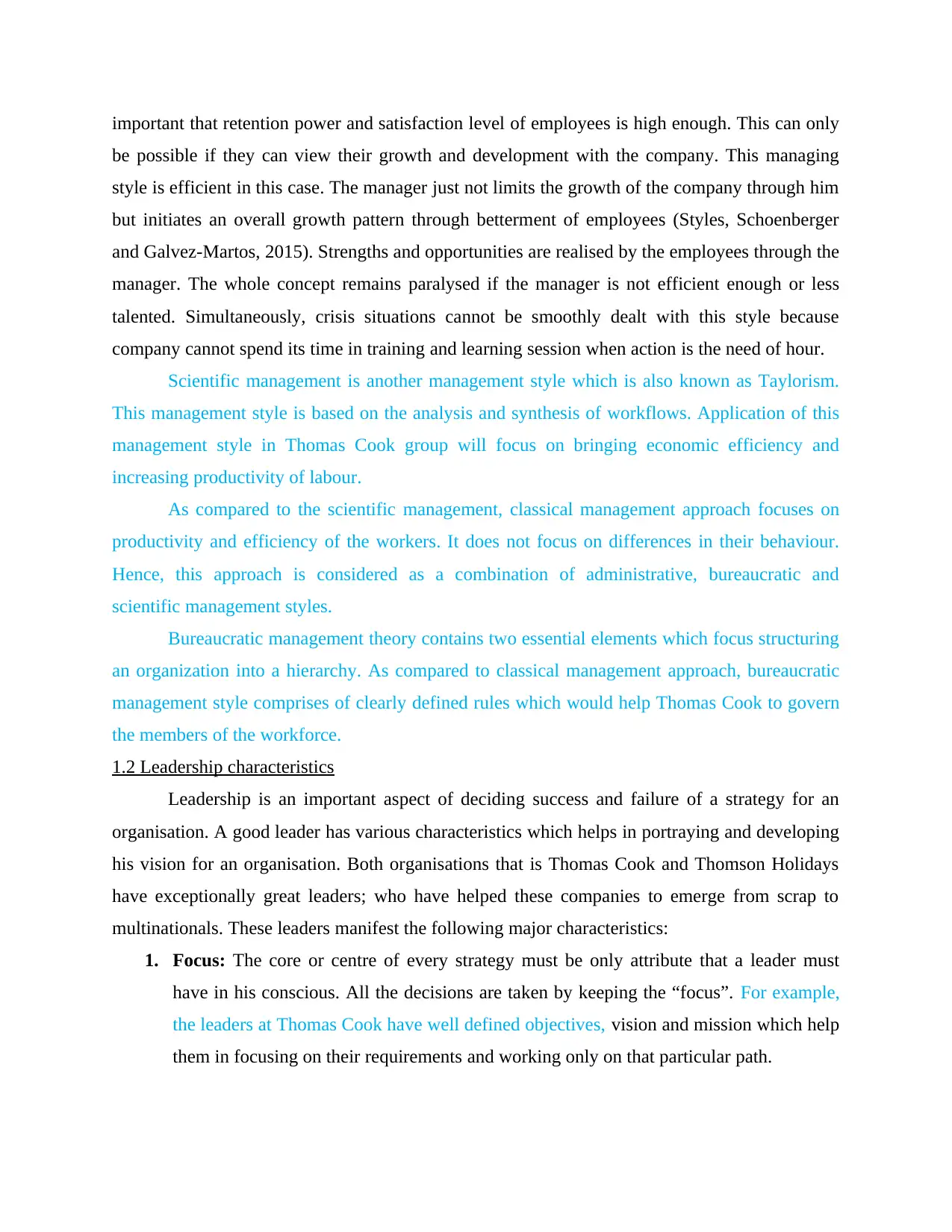
important that retention power and satisfaction level of employees is high enough. This can only
be possible if they can view their growth and development with the company. This managing
style is efficient in this case. The manager just not limits the growth of the company through him
but initiates an overall growth pattern through betterment of employees (Styles, Schoenberger
and Galvez-Martos, 2015). Strengths and opportunities are realised by the employees through the
manager. The whole concept remains paralysed if the manager is not efficient enough or less
talented. Simultaneously, crisis situations cannot be smoothly dealt with this style because
company cannot spend its time in training and learning session when action is the need of hour.
Scientific management is another management style which is also known as Taylorism.
This management style is based on the analysis and synthesis of workflows. Application of this
management style in Thomas Cook group will focus on bringing economic efficiency and
increasing productivity of labour.
As compared to the scientific management, classical management approach focuses on
productivity and efficiency of the workers. It does not focus on differences in their behaviour.
Hence, this approach is considered as a combination of administrative, bureaucratic and
scientific management styles.
Bureaucratic management theory contains two essential elements which focus structuring
an organization into a hierarchy. As compared to classical management approach, bureaucratic
management style comprises of clearly defined rules which would help Thomas Cook to govern
the members of the workforce.
1.2 Leadership characteristics
Leadership is an important aspect of deciding success and failure of a strategy for an
organisation. A good leader has various characteristics which helps in portraying and developing
his vision for an organisation. Both organisations that is Thomas Cook and Thomson Holidays
have exceptionally great leaders; who have helped these companies to emerge from scrap to
multinationals. These leaders manifest the following major characteristics:
1. Focus: The core or centre of every strategy must be only attribute that a leader must
have in his conscious. All the decisions are taken by keeping the “focus”. For example,
the leaders at Thomas Cook have well defined objectives, vision and mission which help
them in focusing on their requirements and working only on that particular path.
be possible if they can view their growth and development with the company. This managing
style is efficient in this case. The manager just not limits the growth of the company through him
but initiates an overall growth pattern through betterment of employees (Styles, Schoenberger
and Galvez-Martos, 2015). Strengths and opportunities are realised by the employees through the
manager. The whole concept remains paralysed if the manager is not efficient enough or less
talented. Simultaneously, crisis situations cannot be smoothly dealt with this style because
company cannot spend its time in training and learning session when action is the need of hour.
Scientific management is another management style which is also known as Taylorism.
This management style is based on the analysis and synthesis of workflows. Application of this
management style in Thomas Cook group will focus on bringing economic efficiency and
increasing productivity of labour.
As compared to the scientific management, classical management approach focuses on
productivity and efficiency of the workers. It does not focus on differences in their behaviour.
Hence, this approach is considered as a combination of administrative, bureaucratic and
scientific management styles.
Bureaucratic management theory contains two essential elements which focus structuring
an organization into a hierarchy. As compared to classical management approach, bureaucratic
management style comprises of clearly defined rules which would help Thomas Cook to govern
the members of the workforce.
1.2 Leadership characteristics
Leadership is an important aspect of deciding success and failure of a strategy for an
organisation. A good leader has various characteristics which helps in portraying and developing
his vision for an organisation. Both organisations that is Thomas Cook and Thomson Holidays
have exceptionally great leaders; who have helped these companies to emerge from scrap to
multinationals. These leaders manifest the following major characteristics:
1. Focus: The core or centre of every strategy must be only attribute that a leader must
have in his conscious. All the decisions are taken by keeping the “focus”. For example,
the leaders at Thomas Cook have well defined objectives, vision and mission which help
them in focusing on their requirements and working only on that particular path.
Paraphrase This Document
Need a fresh take? Get an instant paraphrase of this document with our AI Paraphraser
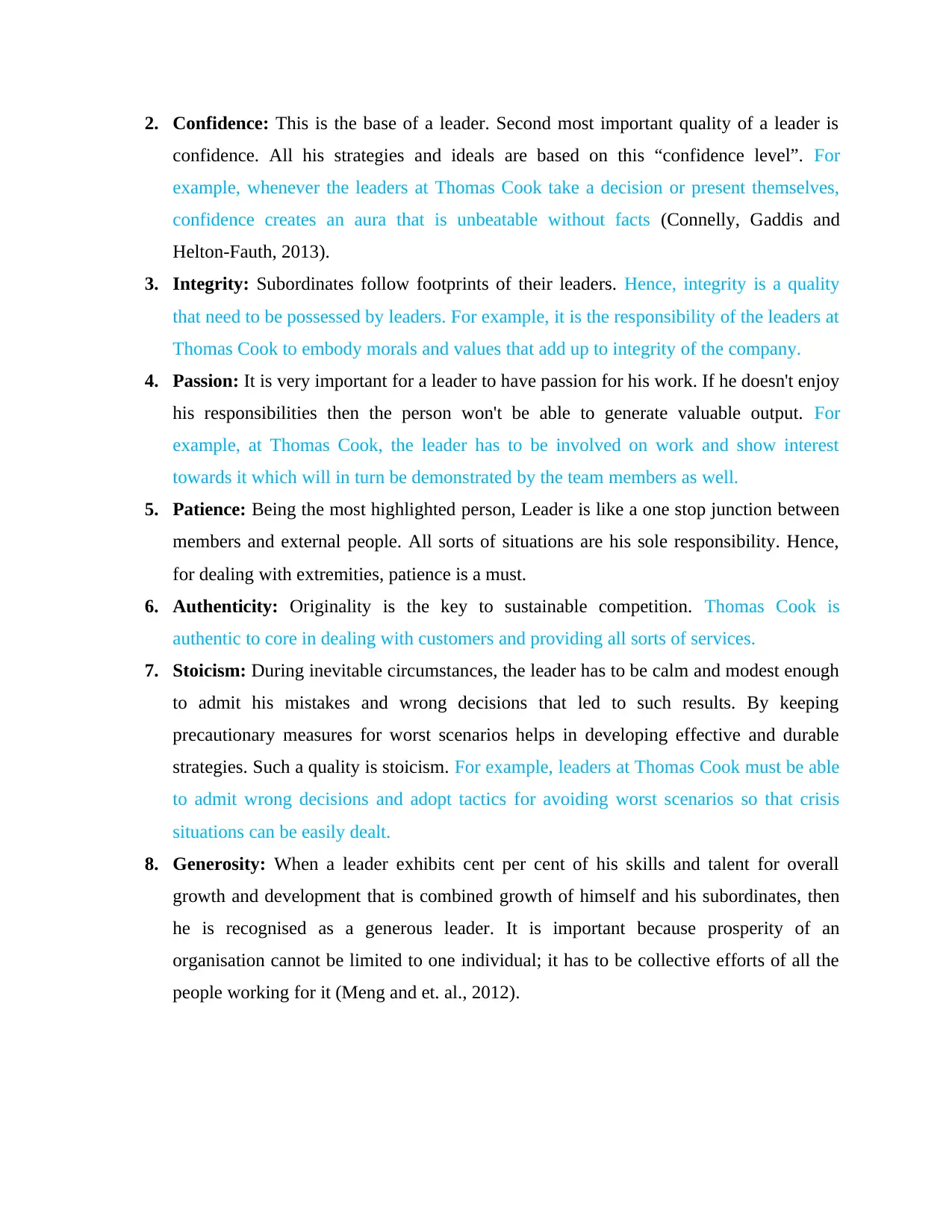
2. Confidence: This is the base of a leader. Second most important quality of a leader is
confidence. All his strategies and ideals are based on this “confidence level”. For
example, whenever the leaders at Thomas Cook take a decision or present themselves,
confidence creates an aura that is unbeatable without facts (Connelly, Gaddis and
Helton-Fauth, 2013).
3. Integrity: Subordinates follow footprints of their leaders. Hence, integrity is a quality
that need to be possessed by leaders. For example, it is the responsibility of the leaders at
Thomas Cook to embody morals and values that add up to integrity of the company.
4. Passion: It is very important for a leader to have passion for his work. If he doesn't enjoy
his responsibilities then the person won't be able to generate valuable output. For
example, at Thomas Cook, the leader has to be involved on work and show interest
towards it which will in turn be demonstrated by the team members as well.
5. Patience: Being the most highlighted person, Leader is like a one stop junction between
members and external people. All sorts of situations are his sole responsibility. Hence,
for dealing with extremities, patience is a must.
6. Authenticity: Originality is the key to sustainable competition. Thomas Cook is
authentic to core in dealing with customers and providing all sorts of services.
7. Stoicism: During inevitable circumstances, the leader has to be calm and modest enough
to admit his mistakes and wrong decisions that led to such results. By keeping
precautionary measures for worst scenarios helps in developing effective and durable
strategies. Such a quality is stoicism. For example, leaders at Thomas Cook must be able
to admit wrong decisions and adopt tactics for avoiding worst scenarios so that crisis
situations can be easily dealt.
8. Generosity: When a leader exhibits cent per cent of his skills and talent for overall
growth and development that is combined growth of himself and his subordinates, then
he is recognised as a generous leader. It is important because prosperity of an
organisation cannot be limited to one individual; it has to be collective efforts of all the
people working for it (Meng and et. al., 2012).
confidence. All his strategies and ideals are based on this “confidence level”. For
example, whenever the leaders at Thomas Cook take a decision or present themselves,
confidence creates an aura that is unbeatable without facts (Connelly, Gaddis and
Helton-Fauth, 2013).
3. Integrity: Subordinates follow footprints of their leaders. Hence, integrity is a quality
that need to be possessed by leaders. For example, it is the responsibility of the leaders at
Thomas Cook to embody morals and values that add up to integrity of the company.
4. Passion: It is very important for a leader to have passion for his work. If he doesn't enjoy
his responsibilities then the person won't be able to generate valuable output. For
example, at Thomas Cook, the leader has to be involved on work and show interest
towards it which will in turn be demonstrated by the team members as well.
5. Patience: Being the most highlighted person, Leader is like a one stop junction between
members and external people. All sorts of situations are his sole responsibility. Hence,
for dealing with extremities, patience is a must.
6. Authenticity: Originality is the key to sustainable competition. Thomas Cook is
authentic to core in dealing with customers and providing all sorts of services.
7. Stoicism: During inevitable circumstances, the leader has to be calm and modest enough
to admit his mistakes and wrong decisions that led to such results. By keeping
precautionary measures for worst scenarios helps in developing effective and durable
strategies. Such a quality is stoicism. For example, leaders at Thomas Cook must be able
to admit wrong decisions and adopt tactics for avoiding worst scenarios so that crisis
situations can be easily dealt.
8. Generosity: When a leader exhibits cent per cent of his skills and talent for overall
growth and development that is combined growth of himself and his subordinates, then
he is recognised as a generous leader. It is important because prosperity of an
organisation cannot be limited to one individual; it has to be collective efforts of all the
people working for it (Meng and et. al., 2012).
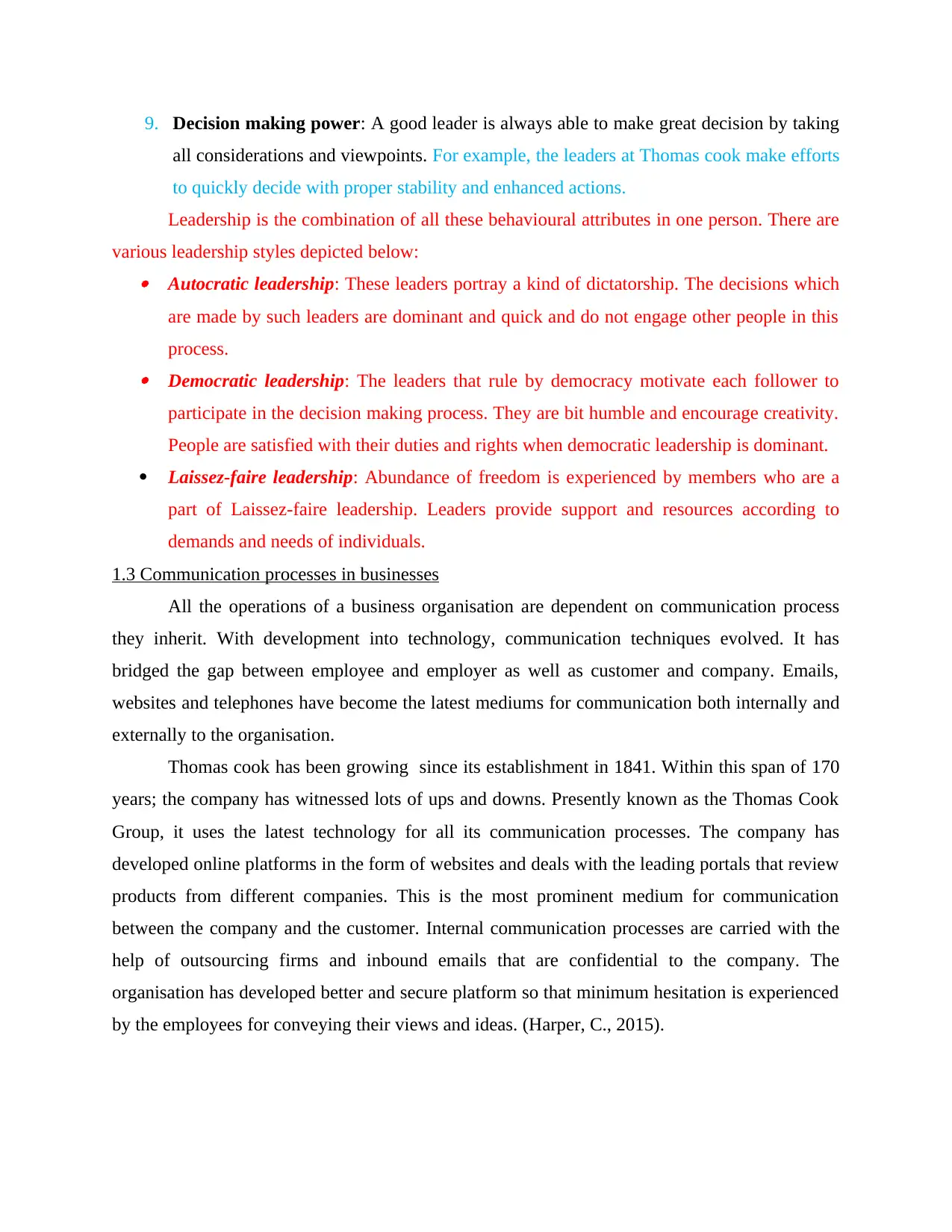
9. Decision making power: A good leader is always able to make great decision by taking
all considerations and viewpoints. For example, the leaders at Thomas cook make efforts
to quickly decide with proper stability and enhanced actions.
Leadership is the combination of all these behavioural attributes in one person. There are
various leadership styles depicted below: Autocratic leadership: These leaders portray a kind of dictatorship. The decisions which
are made by such leaders are dominant and quick and do not engage other people in this
process. Democratic leadership: The leaders that rule by democracy motivate each follower to
participate in the decision making process. They are bit humble and encourage creativity.
People are satisfied with their duties and rights when democratic leadership is dominant.
Laissez-faire leadership: Abundance of freedom is experienced by members who are a
part of Laissez-faire leadership. Leaders provide support and resources according to
demands and needs of individuals.
1.3 Communication processes in businesses
All the operations of a business organisation are dependent on communication process
they inherit. With development into technology, communication techniques evolved. It has
bridged the gap between employee and employer as well as customer and company. Emails,
websites and telephones have become the latest mediums for communication both internally and
externally to the organisation.
Thomas cook has been growing since its establishment in 1841. Within this span of 170
years; the company has witnessed lots of ups and downs. Presently known as the Thomas Cook
Group, it uses the latest technology for all its communication processes. The company has
developed online platforms in the form of websites and deals with the leading portals that review
products from different companies. This is the most prominent medium for communication
between the company and the customer. Internal communication processes are carried with the
help of outsourcing firms and inbound emails that are confidential to the company. The
organisation has developed better and secure platform so that minimum hesitation is experienced
by the employees for conveying their views and ideas. (Harper, C., 2015).
all considerations and viewpoints. For example, the leaders at Thomas cook make efforts
to quickly decide with proper stability and enhanced actions.
Leadership is the combination of all these behavioural attributes in one person. There are
various leadership styles depicted below: Autocratic leadership: These leaders portray a kind of dictatorship. The decisions which
are made by such leaders are dominant and quick and do not engage other people in this
process. Democratic leadership: The leaders that rule by democracy motivate each follower to
participate in the decision making process. They are bit humble and encourage creativity.
People are satisfied with their duties and rights when democratic leadership is dominant.
Laissez-faire leadership: Abundance of freedom is experienced by members who are a
part of Laissez-faire leadership. Leaders provide support and resources according to
demands and needs of individuals.
1.3 Communication processes in businesses
All the operations of a business organisation are dependent on communication process
they inherit. With development into technology, communication techniques evolved. It has
bridged the gap between employee and employer as well as customer and company. Emails,
websites and telephones have become the latest mediums for communication both internally and
externally to the organisation.
Thomas cook has been growing since its establishment in 1841. Within this span of 170
years; the company has witnessed lots of ups and downs. Presently known as the Thomas Cook
Group, it uses the latest technology for all its communication processes. The company has
developed online platforms in the form of websites and deals with the leading portals that review
products from different companies. This is the most prominent medium for communication
between the company and the customer. Internal communication processes are carried with the
help of outsourcing firms and inbound emails that are confidential to the company. The
organisation has developed better and secure platform so that minimum hesitation is experienced
by the employees for conveying their views and ideas. (Harper, C., 2015).
⊘ This is a preview!⊘
Do you want full access?
Subscribe today to unlock all pages.

Trusted by 1+ million students worldwide
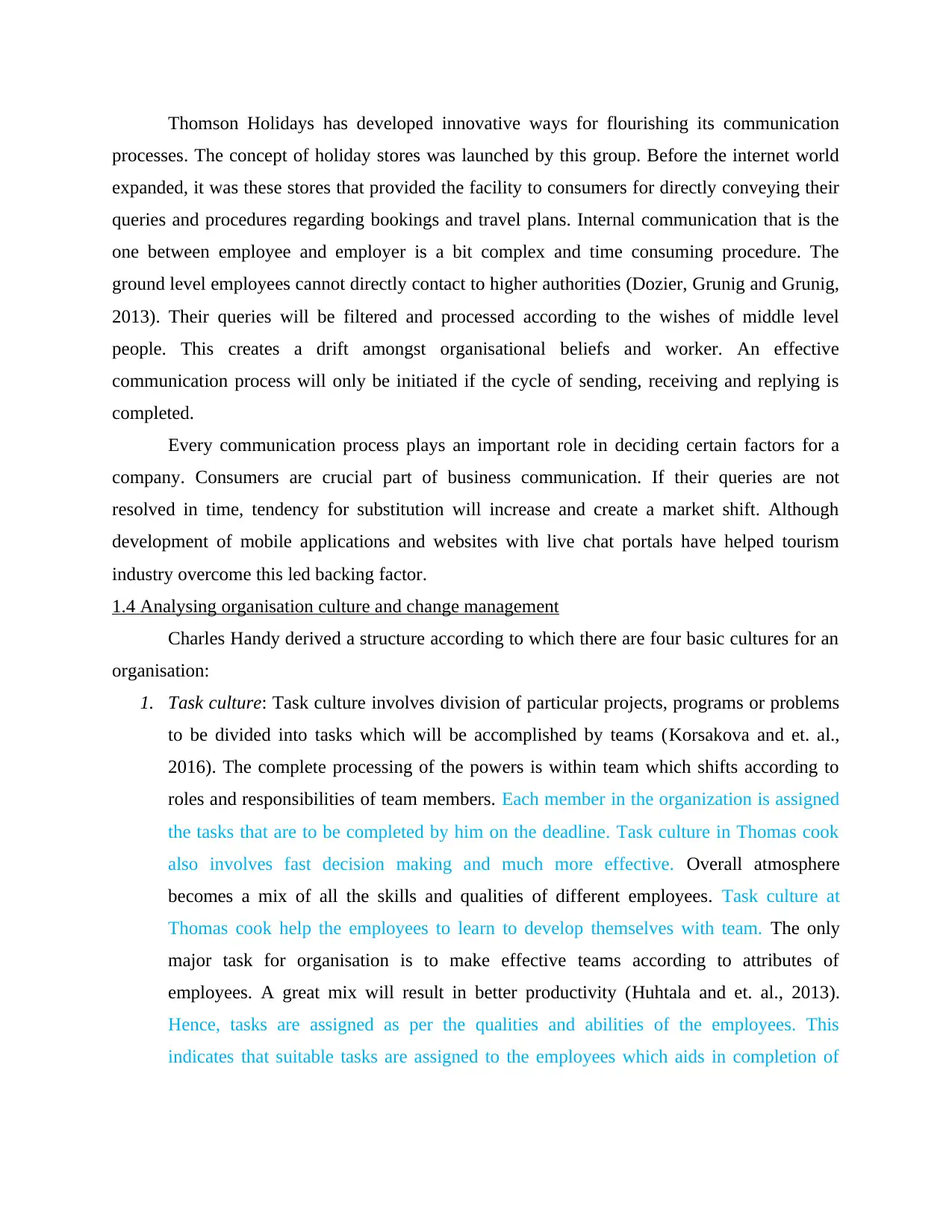
Thomson Holidays has developed innovative ways for flourishing its communication
processes. The concept of holiday stores was launched by this group. Before the internet world
expanded, it was these stores that provided the facility to consumers for directly conveying their
queries and procedures regarding bookings and travel plans. Internal communication that is the
one between employee and employer is a bit complex and time consuming procedure. The
ground level employees cannot directly contact to higher authorities (Dozier, Grunig and Grunig,
2013). Their queries will be filtered and processed according to the wishes of middle level
people. This creates a drift amongst organisational beliefs and worker. An effective
communication process will only be initiated if the cycle of sending, receiving and replying is
completed.
Every communication process plays an important role in deciding certain factors for a
company. Consumers are crucial part of business communication. If their queries are not
resolved in time, tendency for substitution will increase and create a market shift. Although
development of mobile applications and websites with live chat portals have helped tourism
industry overcome this led backing factor.
1.4 Analysing organisation culture and change management
Charles Handy derived a structure according to which there are four basic cultures for an
organisation:
1. Task culture: Task culture involves division of particular projects, programs or problems
to be divided into tasks which will be accomplished by teams (Korsakova and et. al.,
2016). The complete processing of the powers is within team which shifts according to
roles and responsibilities of team members. Each member in the organization is assigned
the tasks that are to be completed by him on the deadline. Task culture in Thomas cook
also involves fast decision making and much more effective. Overall atmosphere
becomes a mix of all the skills and qualities of different employees. Task culture at
Thomas cook help the employees to learn to develop themselves with team. The only
major task for organisation is to make effective teams according to attributes of
employees. A great mix will result in better productivity (Huhtala and et. al., 2013).
Hence, tasks are assigned as per the qualities and abilities of the employees. This
indicates that suitable tasks are assigned to the employees which aids in completion of
processes. The concept of holiday stores was launched by this group. Before the internet world
expanded, it was these stores that provided the facility to consumers for directly conveying their
queries and procedures regarding bookings and travel plans. Internal communication that is the
one between employee and employer is a bit complex and time consuming procedure. The
ground level employees cannot directly contact to higher authorities (Dozier, Grunig and Grunig,
2013). Their queries will be filtered and processed according to the wishes of middle level
people. This creates a drift amongst organisational beliefs and worker. An effective
communication process will only be initiated if the cycle of sending, receiving and replying is
completed.
Every communication process plays an important role in deciding certain factors for a
company. Consumers are crucial part of business communication. If their queries are not
resolved in time, tendency for substitution will increase and create a market shift. Although
development of mobile applications and websites with live chat portals have helped tourism
industry overcome this led backing factor.
1.4 Analysing organisation culture and change management
Charles Handy derived a structure according to which there are four basic cultures for an
organisation:
1. Task culture: Task culture involves division of particular projects, programs or problems
to be divided into tasks which will be accomplished by teams (Korsakova and et. al.,
2016). The complete processing of the powers is within team which shifts according to
roles and responsibilities of team members. Each member in the organization is assigned
the tasks that are to be completed by him on the deadline. Task culture in Thomas cook
also involves fast decision making and much more effective. Overall atmosphere
becomes a mix of all the skills and qualities of different employees. Task culture at
Thomas cook help the employees to learn to develop themselves with team. The only
major task for organisation is to make effective teams according to attributes of
employees. A great mix will result in better productivity (Huhtala and et. al., 2013).
Hence, tasks are assigned as per the qualities and abilities of the employees. This
indicates that suitable tasks are assigned to the employees which aids in completion of
Paraphrase This Document
Need a fresh take? Get an instant paraphrase of this document with our AI Paraphraser
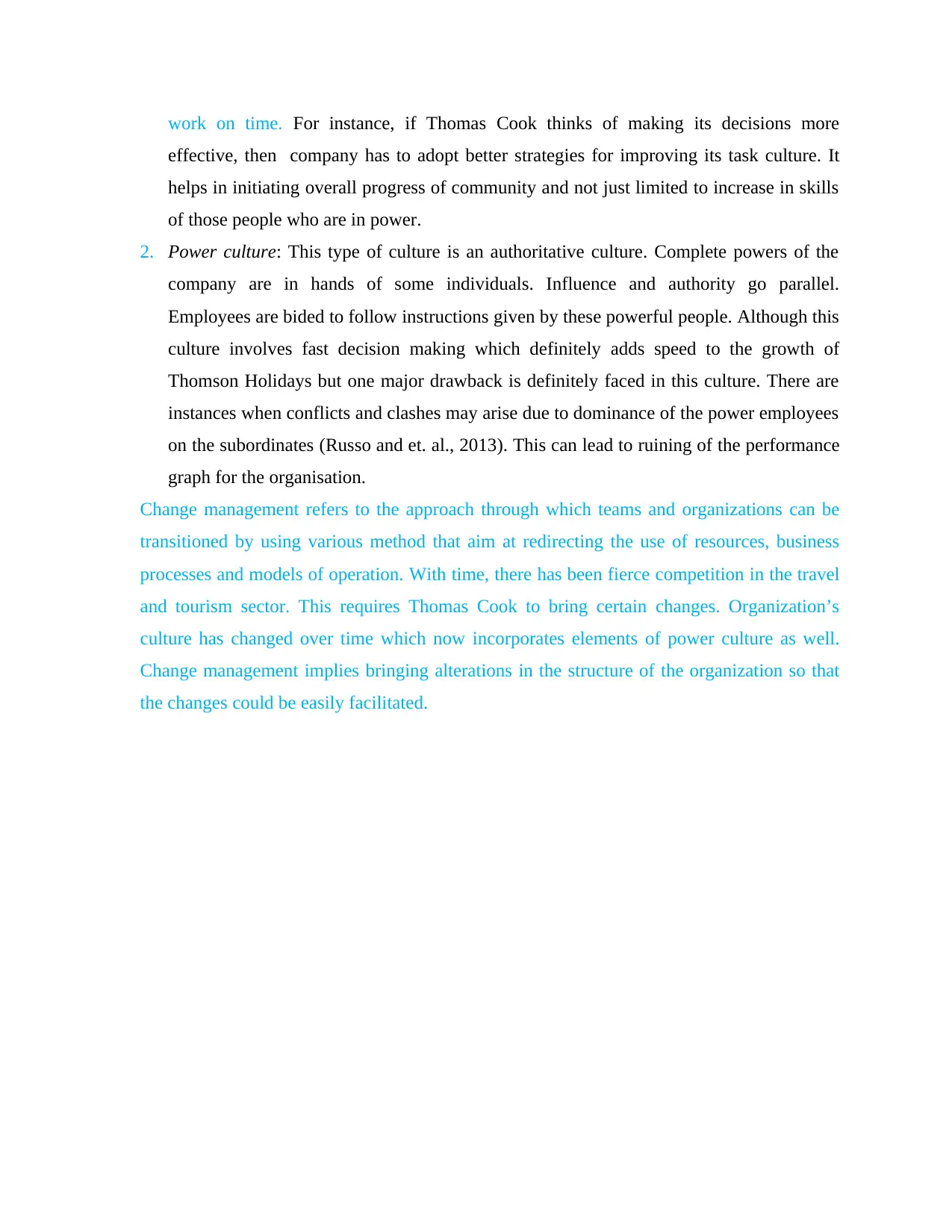
work on time. For instance, if Thomas Cook thinks of making its decisions more
effective, then company has to adopt better strategies for improving its task culture. It
helps in initiating overall progress of community and not just limited to increase in skills
of those people who are in power.
2. Power culture: This type of culture is an authoritative culture. Complete powers of the
company are in hands of some individuals. Influence and authority go parallel.
Employees are bided to follow instructions given by these powerful people. Although this
culture involves fast decision making which definitely adds speed to the growth of
Thomson Holidays but one major drawback is definitely faced in this culture. There are
instances when conflicts and clashes may arise due to dominance of the power employees
on the subordinates (Russo and et. al., 2013). This can lead to ruining of the performance
graph for the organisation.
Change management refers to the approach through which teams and organizations can be
transitioned by using various method that aim at redirecting the use of resources, business
processes and models of operation. With time, there has been fierce competition in the travel
and tourism sector. This requires Thomas Cook to bring certain changes. Organization’s
culture has changed over time which now incorporates elements of power culture as well.
Change management implies bringing alterations in the structure of the organization so that
the changes could be easily facilitated.
effective, then company has to adopt better strategies for improving its task culture. It
helps in initiating overall progress of community and not just limited to increase in skills
of those people who are in power.
2. Power culture: This type of culture is an authoritative culture. Complete powers of the
company are in hands of some individuals. Influence and authority go parallel.
Employees are bided to follow instructions given by these powerful people. Although this
culture involves fast decision making which definitely adds speed to the growth of
Thomson Holidays but one major drawback is definitely faced in this culture. There are
instances when conflicts and clashes may arise due to dominance of the power employees
on the subordinates (Russo and et. al., 2013). This can lead to ruining of the performance
graph for the organisation.
Change management refers to the approach through which teams and organizations can be
transitioned by using various method that aim at redirecting the use of resources, business
processes and models of operation. With time, there has been fierce competition in the travel
and tourism sector. This requires Thomas Cook to bring certain changes. Organization’s
culture has changed over time which now incorporates elements of power culture as well.
Change management implies bringing alterations in the structure of the organization so that
the changes could be easily facilitated.
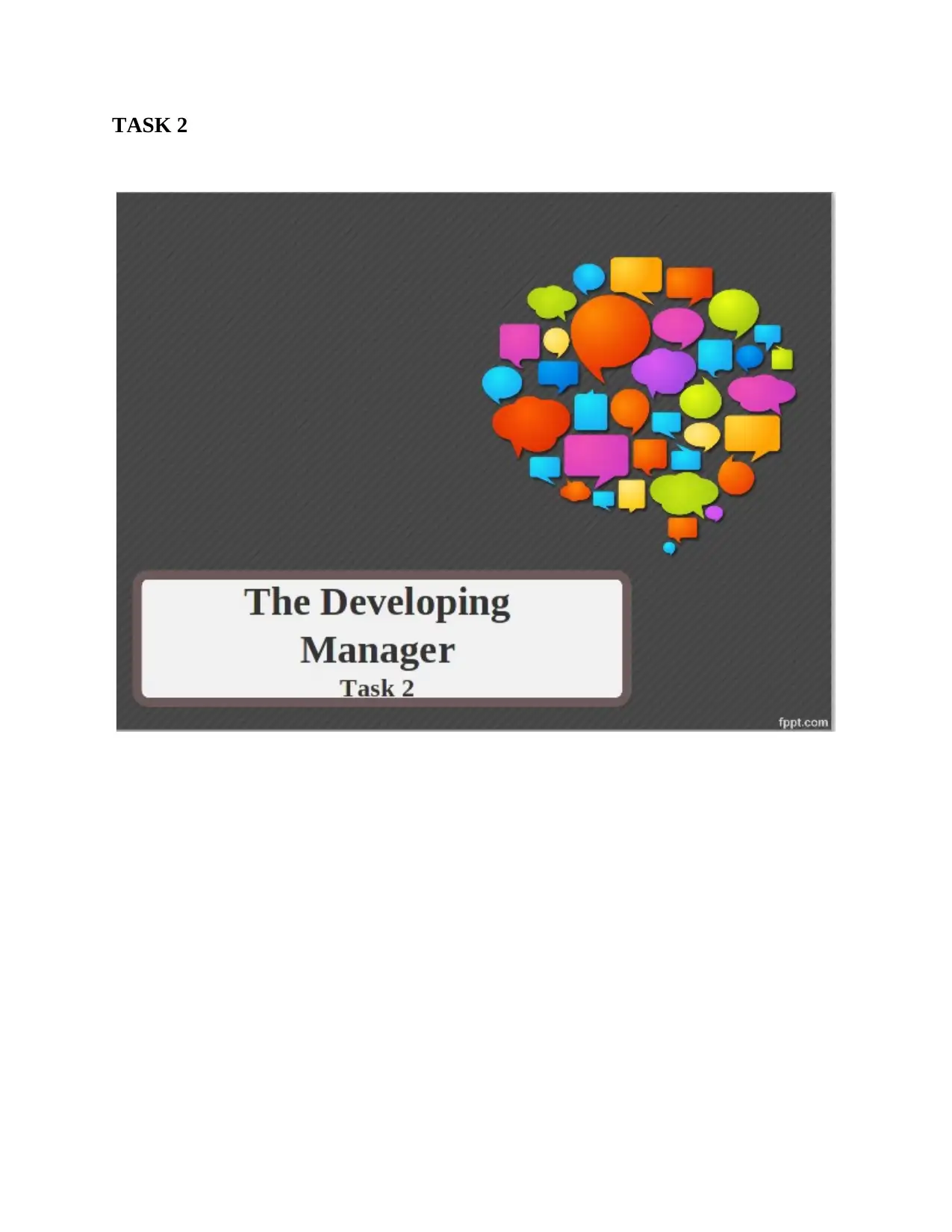
TASK 2
⊘ This is a preview!⊘
Do you want full access?
Subscribe today to unlock all pages.

Trusted by 1+ million students worldwide
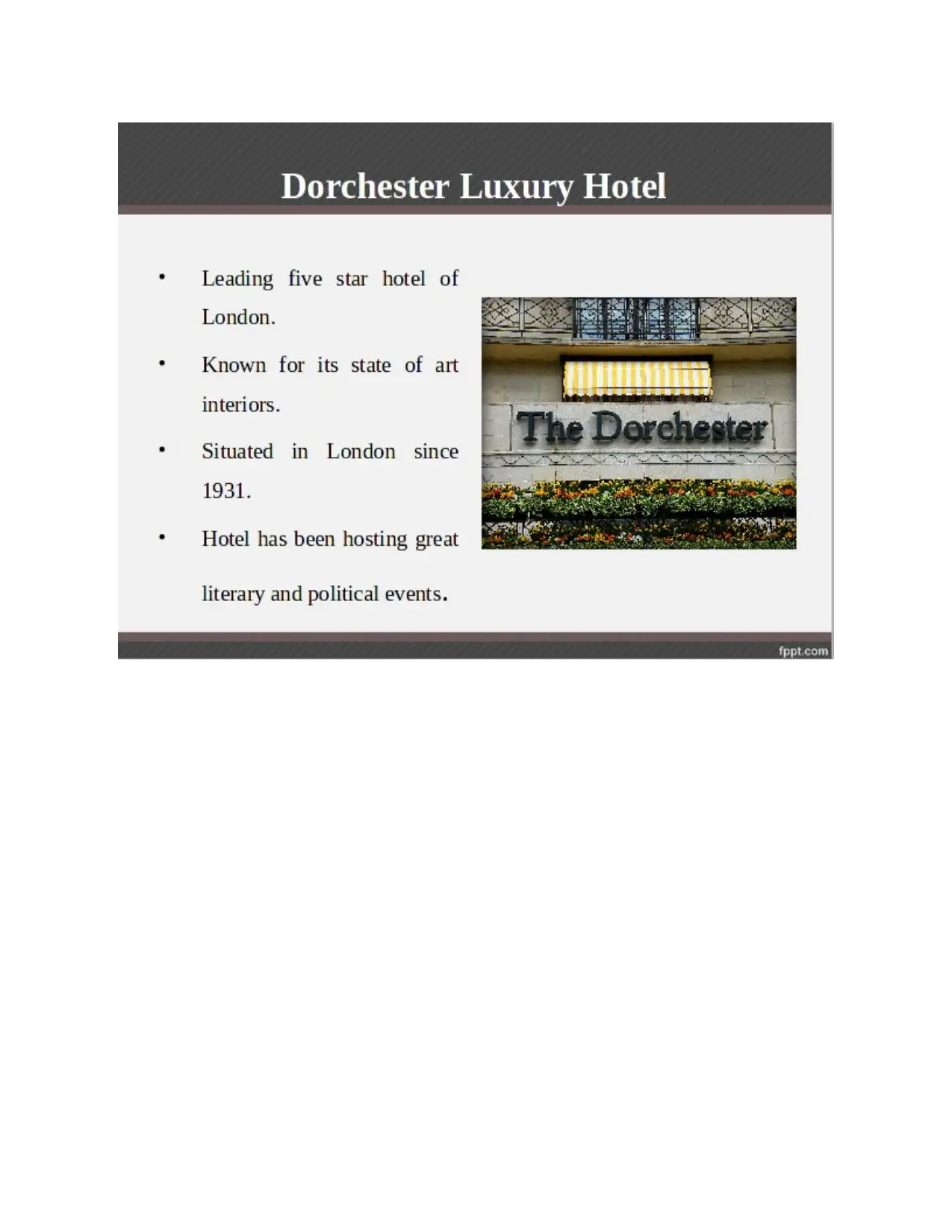
Paraphrase This Document
Need a fresh take? Get an instant paraphrase of this document with our AI Paraphraser
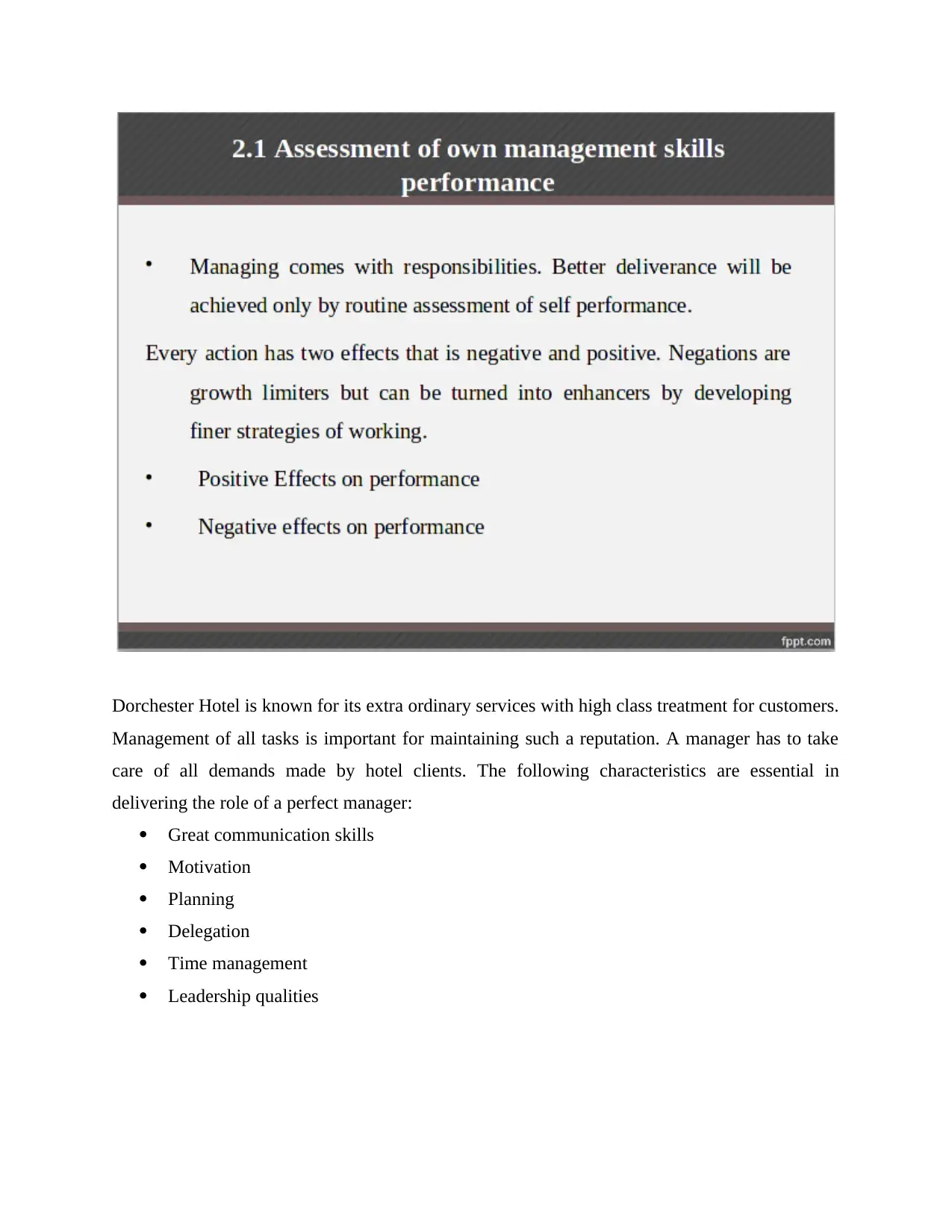
Dorchester Hotel is known for its extra ordinary services with high class treatment for customers.
Management of all tasks is important for maintaining such a reputation. A manager has to take
care of all demands made by hotel clients. The following characteristics are essential in
delivering the role of a perfect manager:
Great communication skills
Motivation
Planning
Delegation
Time management
Leadership qualities
Management of all tasks is important for maintaining such a reputation. A manager has to take
care of all demands made by hotel clients. The following characteristics are essential in
delivering the role of a perfect manager:
Great communication skills
Motivation
Planning
Delegation
Time management
Leadership qualities
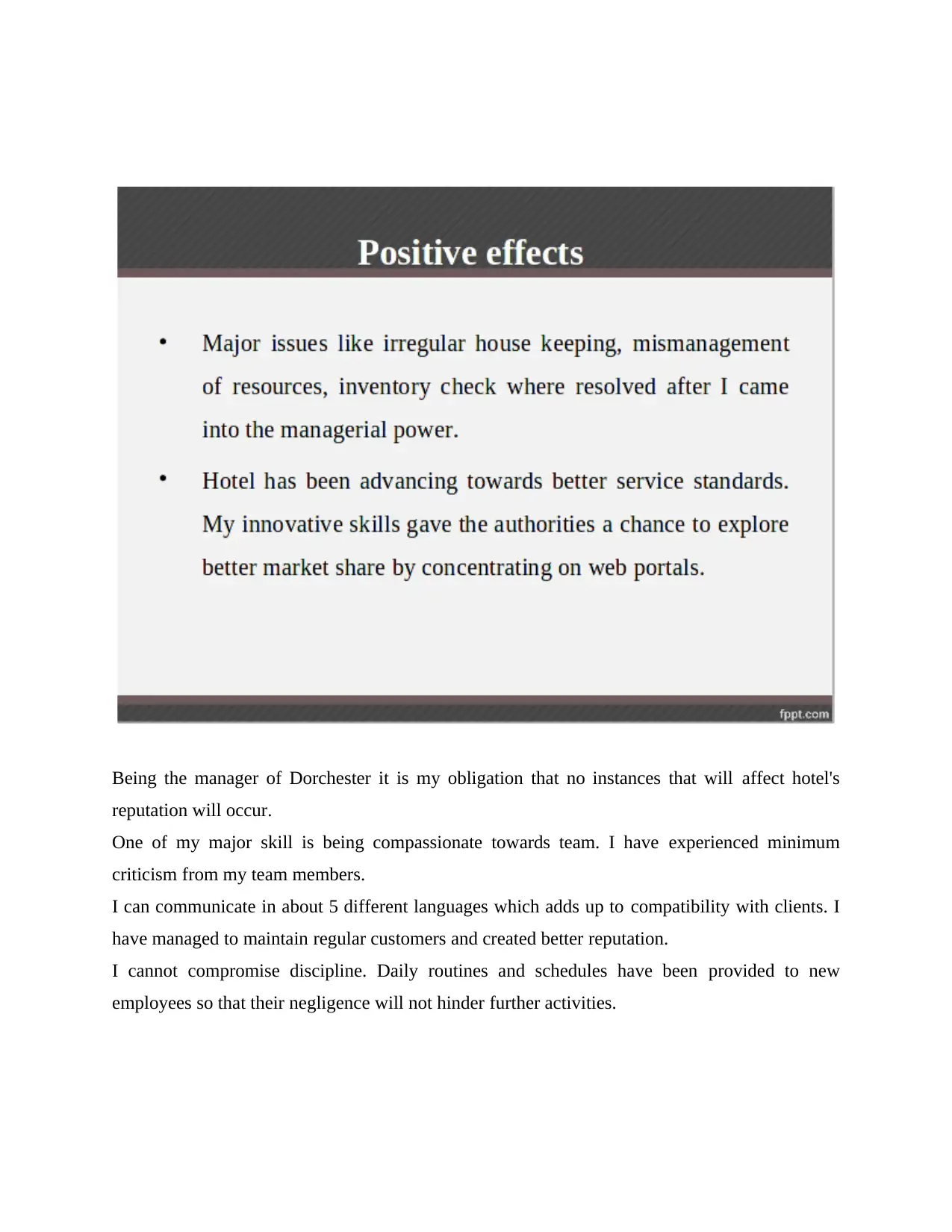
Being the manager of Dorchester it is my obligation that no instances that will affect hotel's
reputation will occur.
One of my major skill is being compassionate towards team. I have experienced minimum
criticism from my team members.
I can communicate in about 5 different languages which adds up to compatibility with clients. I
have managed to maintain regular customers and created better reputation.
I cannot compromise discipline. Daily routines and schedules have been provided to new
employees so that their negligence will not hinder further activities.
reputation will occur.
One of my major skill is being compassionate towards team. I have experienced minimum
criticism from my team members.
I can communicate in about 5 different languages which adds up to compatibility with clients. I
have managed to maintain regular customers and created better reputation.
I cannot compromise discipline. Daily routines and schedules have been provided to new
employees so that their negligence will not hinder further activities.
⊘ This is a preview!⊘
Do you want full access?
Subscribe today to unlock all pages.

Trusted by 1+ million students worldwide
1 out of 31
Related Documents
Your All-in-One AI-Powered Toolkit for Academic Success.
+13062052269
info@desklib.com
Available 24*7 on WhatsApp / Email
![[object Object]](/_next/static/media/star-bottom.7253800d.svg)
Unlock your academic potential
Copyright © 2020–2026 A2Z Services. All Rights Reserved. Developed and managed by ZUCOL.





